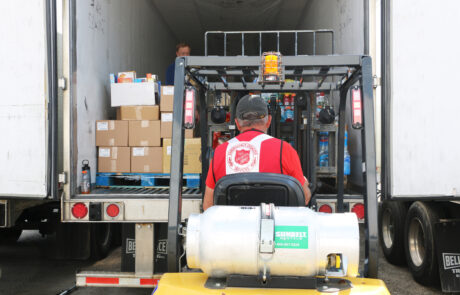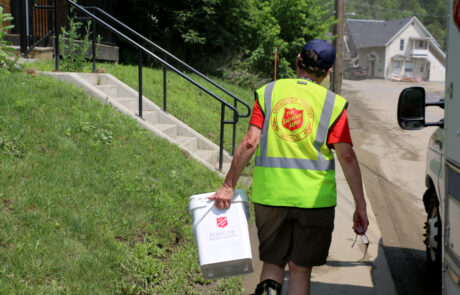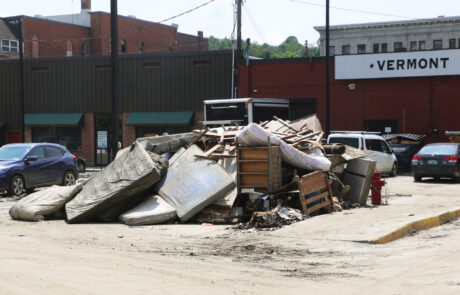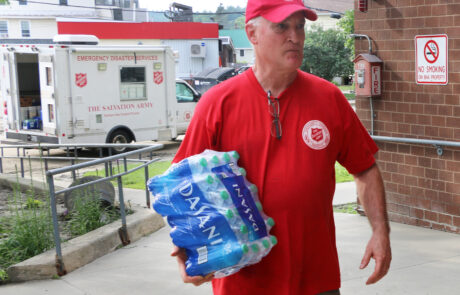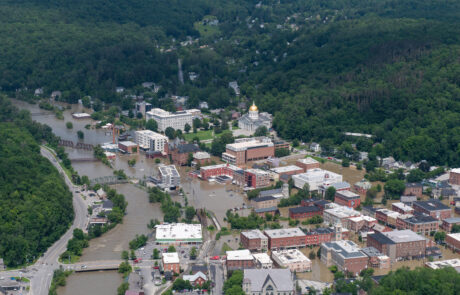Praising God Through the Storm
by Hugo Bravo
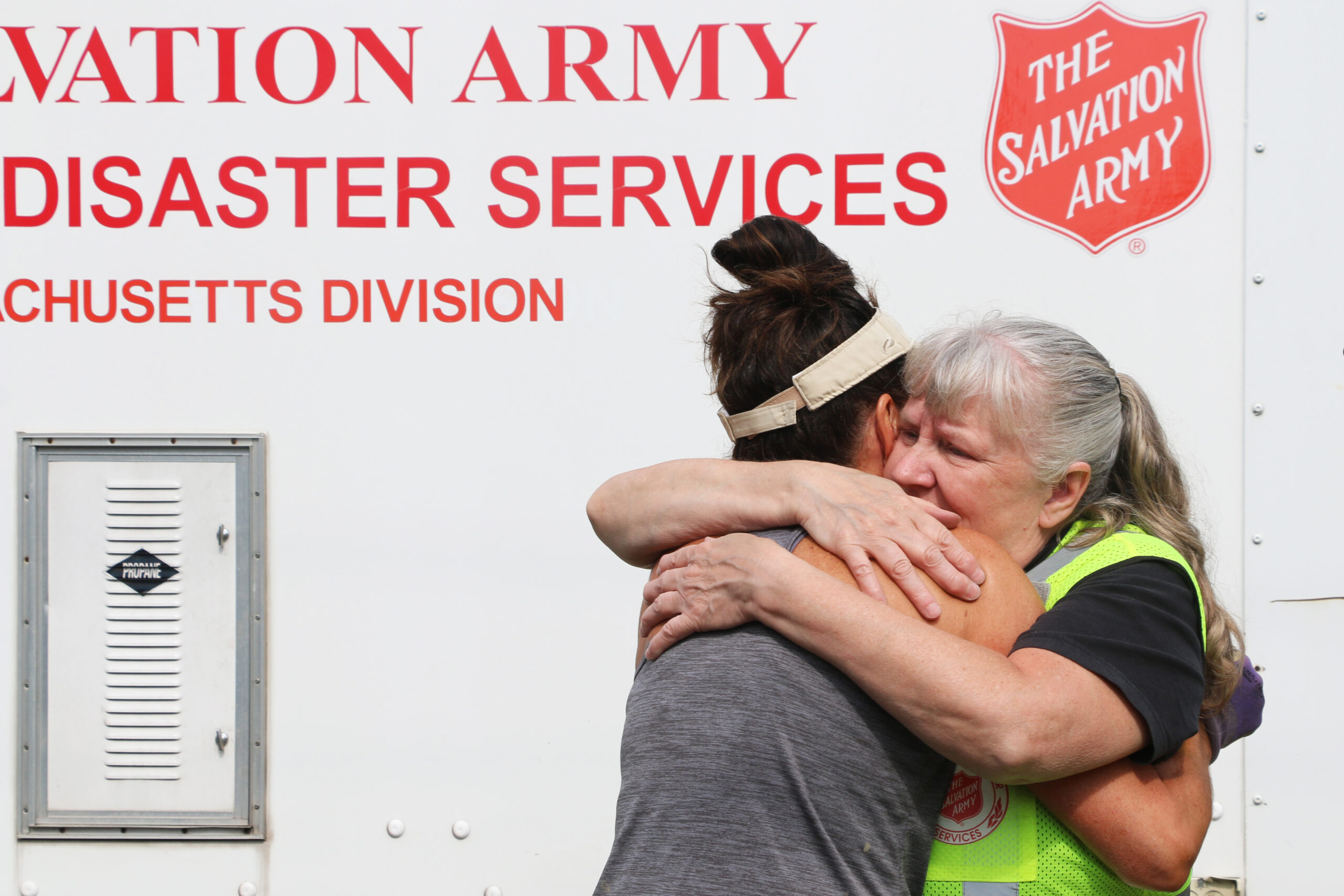
During the worst flooding disaster Vermont had seen in decades, pastors Keith and Katherine Jache led recovery efforts in the name of God and The Salvation Army.
When Major Keith Jache talks to cadets at The Salvation Army College for Officer Training, he shares a crucial piece of advice to those men and women who will one day be pastors, likely in communities far from their hometowns.
“When you arrive at your new assignment, there are certain people you should seek out and get to know immediately. Of course, people like the mayor are important but also town management workers like the local fire chief. In a disaster situation, that’s the person who is going to be in charge,” says Major Keith.
He understands this from experience. In July of 2023, he and Major Katherine Jache had been the corps officers at the Barre, Vt., Salvation Army for a little over a year. That month, the northeastern United States experienced heavy rainfall and destructive flash floods. Vermont was one of the states most affected. Montpelier, its capital city, just a few miles to the northwest, had its busy downtown area heavily flooded. Residents were left stranded and their properties destroyed.
“We had seen flooding and even tornadoes while serving in Pennsylvania before, so this wasn’t something we were unfamiliar with. But the scope of it was just tremendous. The damage was devastating,” says Major Keith. “I’d also done Emergency Disaster Services with The Salvation Army in the past, so I knew who and what EDS would need. The groundwork was already there for them when they arrived because I had made those connections early on. I knew the town management, and they knew how The Salvation Army can help in these situations.
“Before every encounter with people who had been affected, I prayed to God to give me the words to say to them, because I didn’t have them myself.”
His hands and feet
With the connections made by Major Keith, The Salvation Army hit the ground running. They worked with Enough Ministries, a local church, to deliver food, cleanup kits, and gift cards. Eventually, all assistance efforts shifted to the Barre City Auditorium, a multipurpose arena that could host feedings and even be a place of spiritual and emotional care for the community. This was a time for The Salvation Army to go out and be God’s hands and feet to the people.
“There was a man who would push his wheelchair-bound girlfriend up a hill every day so they could both get food. On a day that it rained heavily, I helped him push,” says Major Keith.
“We met a woman who’d been stranded on the second floor of her home and lost all her pets in the flood,” says Major Katherine. “She was so frail and heartbroken, but she didn’t want anything from us—just someone to listen to her and her pain. The ministry of presence is very important in times like these.”

Then there was Gary, a father who’d just bought a house in Vermont so he could live next door to his daughter. Both lost their homes. Two days later, Gary’s son, who lived in Arizona, died.
“Gary had no idea how he could possibly handle what he was going through in Vermont and bring his son home at the same time. Through the corps, we were able to make arrangements to get his son’s body cremated and brought to Gary, fully paid for,” says Major Keith. “It was a blessing for us that in the midst of all this chaos and sadness, we were able to help a father in a way that we weren’t expecting.”
A homemade church
With both the Barre Corps and its Salvation Army thrift store impacted by the storm, the Jaches did not have a building to use on Sundays. But as unique ministries tend to rise up in unorthodox situations, so do ways to adapt and bring comfort to others.
“We lived on a hill. Our own living quarters weren’t damaged much. So for about a month and a half, we had worship services in our home,” says Major Katherine. “That first Sunday was more of a grieving session. Many people were frustrated, sad, or angry at the process it would take to recover what they had lost. At the same time, we talked about how each of us were helping our neighbors and what we needed to do going forward. Then we set time aside to pray and sing some songs.”
That time deeply impacted the officers. In the small space, says Major Katherine, the worship and praise “sounded different, more powerful and meaningful.”
When people are going through such loss, it can feel natural to approach them with a verbal message of Christ’s love. But the pastors saw that sometimes it’s better to come with open eyes and ears and be receptive to pain and grievances.
“Whether it’s listening to their situations or sitting down and going through a FEMA form with them,” says Major Keith, referring to the Federal Emergency Management Agency, “people need to know they’re not alone in times like these.”
“Jesus picked people up first and consoled them through their suffering,” Major Katherine says. “After that, He said to them ‘go and sin no more.’ If someone has lost everything they have, and the first thing you give them is Scripture, they’re not going to see you as a source for help. They’re going to see you as someone just trying to get another number on a statistics board. Letting people express their pain to you is a way of showing the love of Jesus in itself. After that is when the conversations and prayer requests will come.”
The long term
Months after the floods, hundreds of houses in Vermont are still being reconstructed. Boilers and furnaces need to be relocated to higher floors to avoid future damage. These are costly procedures not every family can afford. The state government has discussed creating green spaces along bridges for flood runoff.
“The problem is that there are houses along those areas,” says Major Keith. “People live there because it’s less expensive. Long term, it may create more unhoused people and communities.”
In the spring, the Jaches were transferred to The Salvation Army in Portland, Maine.
“We trusted God in the move, but at the same time, we felt like our work was unfinished,” says Major Keith. “In the first few months of recovery from a disaster, everyone kind of works in a fog. It’s after some time has passed that you really understand what the necessary long-term tools are.”
“It just so happened that around the time of the move,” says Major Katherine, “my mother was having major surgery in, of all places, Portland, allowing us to be close to her. God worked His plan, even though we didn’t know what our future would be.”
Like recovery from disasters, the Lord’s plans and promises are always working over the long term. Just as their experience from serving in Pennsylvania helped the Jaches in Vermont, so will their Vermont experience help them in Portland.
Recently, Major Keith received a call from one of the FEMA workers he met in Barre. “Portland had just received some funding,” says Major Keith, “and FEMA wanted to work with us to see what the city could do to avoid coastal flooding and prepare for their next storm.”

